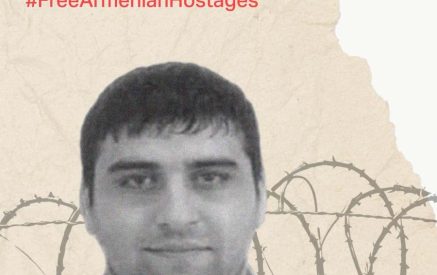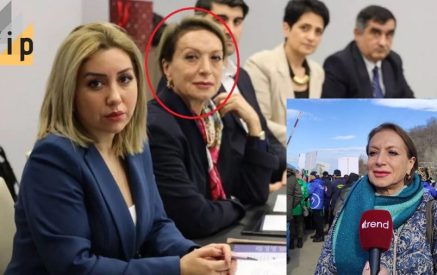The humanitarian situation in Nagorno-Karabakh has been discussed at the United Nations in the context of the risks of atrocity crimes and the preventive mechanisms.
Attended by delegations representing the UN Security Council Member States and stakeholders of multilateral humanitarian cooperation, the meeting featured presentation of the preliminary report by Former Special Advisor to the Secretary-General on the Prevention of Genocide, Professor of Human Rights Law of the American University (Washington, D.C.) Juan Mendez.
Addressing the meeting, the Permanent Representative of Armenia to the UN Mher Margaryan highlighted that the deliberate infliction of dire humanitarian conditions in Nagorno-Karabakh constitutes an atrocity crime, which is already happening, including through the starvation of an entire population, who are being deprived of their basic human rights. Ambassador Margaryan recalled that, at the emergency meeting of the UN Security Council, which was convened at Armenia’s request on 16 August, the majority of the Council’s member states reiterated the imperative of complying with the ICJ orders and ensuring free and unimpeded humanitarian access to Nagorno-Karabakh.
In his presentation, Professor Juan Mendez briefed the delegations on the origins of the mandate of the Secretary-General’s Special Adviser on the Prevention of Genocide and the entrusted tasks, such as bringing the matters to the attention of the UN Security Council through the UN Secretary-General. Focusing on the prevention duty of the international community, Juan Mendez highlighted that the facts constitute sufficient reason to proffer an early warning to the international community that the population of Nagorno-Karabakh is at risk of suffering “serious bodily or mental harm to members of the group” as defined in Article 2 of the Convention on the Prevention and Punishment of Genocide.
Read also
“The lack of compliance with a binding interim measure issued by the ICJ to protect a population at risk is at least as severe an early warning than refusal to cooperate with judicial investigations”, Professor Mendez concluded, pointing out to Azerbaijan’s defiance of the legally binding order of the International Court of Justice as an indication that necessitates the exercise of the UN’s early warning and prevention capacities.
The briefing was followed by a discussion, during which Professor Mendez and Ambassador Margaryan reflected on the questions and comments from the delegations.
Below is an excerpt from Professor Mendez’s report.
“In the current situation in Nagorno-Karabakh I wish to point out the lack of compliance with the International Court of Justice binding order as an indicator that require early warning and offer opportunities to prevent a genocide. I focus my analysis in the prevention duty of the international community. The deliberate blockade of the Lachin Corridor, against the binding order of the International Court of Justice signal the high probability that the members of the group of Armenian living in Nagorno-Karabakh may in the near future suffer “serious bodily or mental harm to members of the group” (Article 2, paragraph b of the Convention on the Prevention and Punishment of Genocide). The excuses offered, the denial of the blockade and the offer of alternative roads to eventually provide food confirm Azerbaijan’s defiance of the ICJ order. As I understand them, the facts are: On November 9, 2020, Azerbaijan, Armenia, and Russia signed the Trilateral Statement ending the war between the first two countries and establishing special agreements regarding Nagorno-Karabakh. “The Lachin corridor (5 km wide), which will ensure the communication between Nagorno-Karabakh and Armenia…shall remain under the control of the peacekeeping contingent of the Russian Federation” for five years. “The Republic of Azerbaijan shall guarantee the safe movement of citizens, vehicles, and cargo in both directions along the Lachin corridor.” On February 22, 2023, the International Court of Justice ordered: “The Republic of Azerbaijan shall, pending the final decision in the case and accordance with its obligations under the International Convention on the Elimination of All Forms of Racial Discrimination, take all measures at its disposal to ensure unimpeded movement of persons, vehicles, and cargo along the Lachin Corridor in both directions.” The order was reaffirmed on July 6, 2023. Instead of complying with the ICJ order Azerbaijan security forces have blocked the Lachin Corridor since March and since June have sealed off any channel connecting a group of Armenians living in Nagorno-Karabakh with Armenia. The ICJ order put Azerbaijan on notice about the “real and imminent risk” created by the blockade to an Armenian group’s “health and life.”
Azerbaijan has ignored calls from the UN Secretary General, the US Secretary of State and the President of France to comply with the ICJ binding order and open the Lachin Corridor. In addition, Azerbaijan officers and experts are denying the facts and offering alternative roads to provide humanitarian assistance, thus confirming their refusal to comply with the ICJ orders. Under the circumstances, it is my considered opinion that the facts outlined above constitute sufficient reason to proffer an early warning to the international community that the population of Nagorno-Karabakh is at risk of suffering“ serious bodily or mental harm to members of the group” (Article 2, paragraph b of the Convention on the Prevention and Punishment of Genocide).
The state parties of the Genocide Convention are committed to prevent the crime, and the international community should exercise its responsibilities to protect that population. I am guided in this conclusion by the jurisprudential precedent adopted by the International Court of Justice in Bosnia v. Serbia regarding the obligation to prevent genocide under the 1948 Convention. In that case, the ICJ established that all States have responsibilities to prevent genocide. Those responsibilities are highest in cases where a State is in a position to influence the situation decisively, because of geographic proximity, cultural or political links to the actors on the ground, control of territory and means of communication and transportation, and so on. In the case of Srebrenica, the ICJ found that Serbia had violated its obligation to prevent genocide, among other factors, because it had refused to cooperate with judicial inquiries. By way of analogy, lack of compliance with a binding interim measure issued by the ICJ precisely to protect a population at risk is at least as severe an early warning than refusal to cooperate with judicial investigations.”




























































